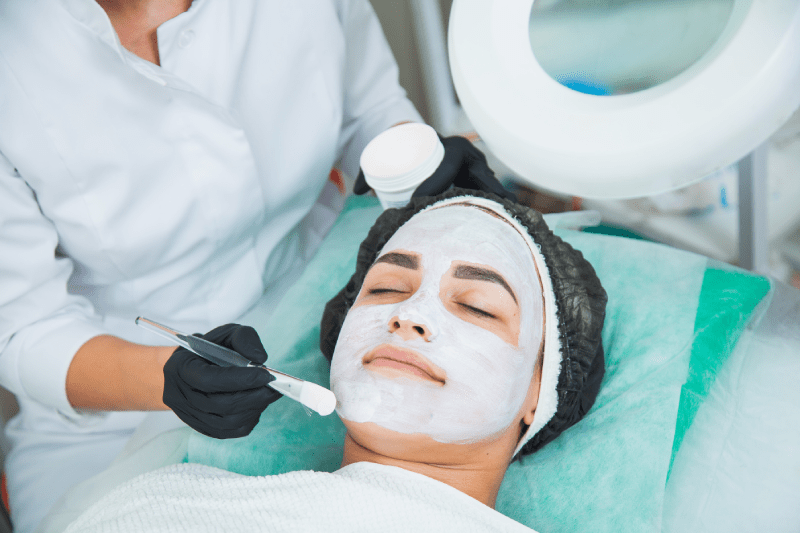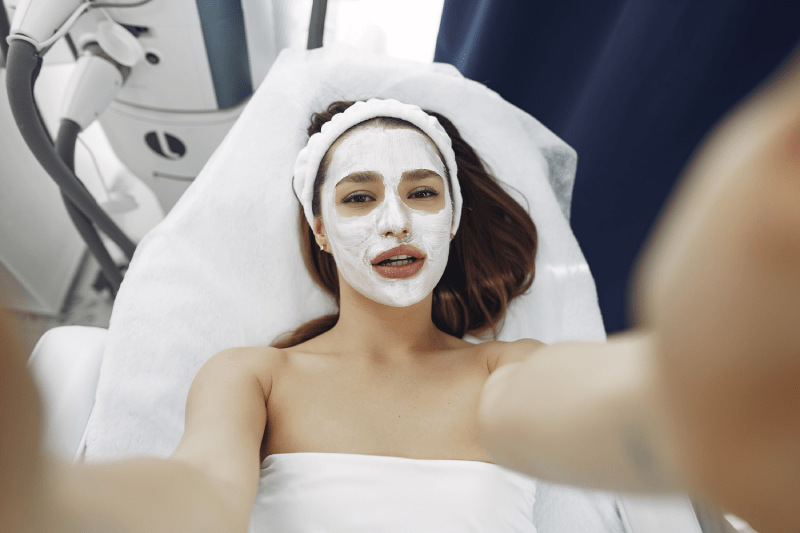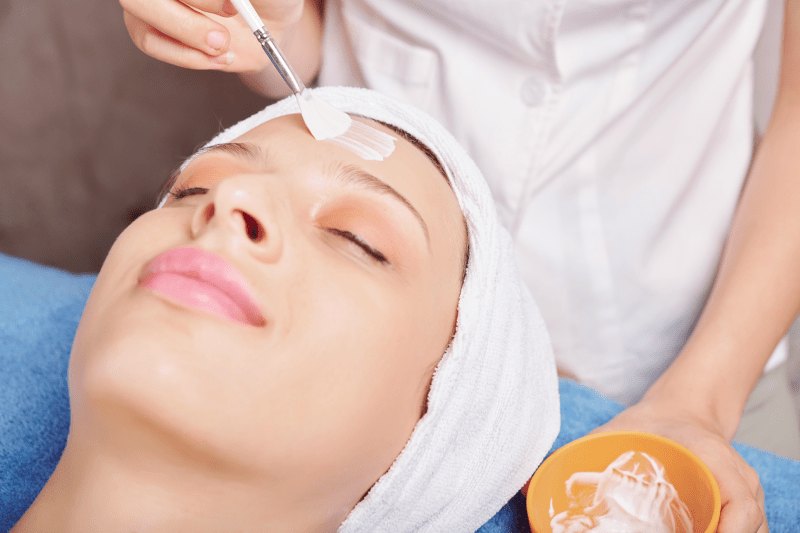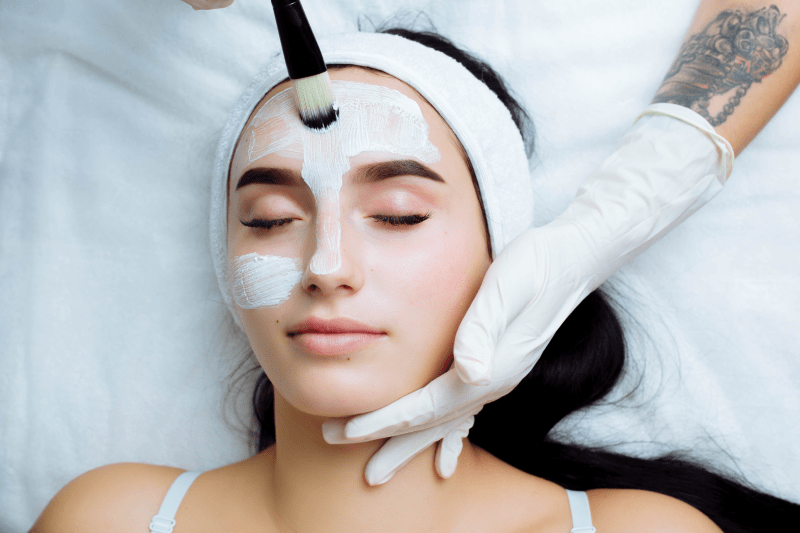What Exactly Is Skin Whitening Treatment?
Skin whitening treatment is a set of aesthetic procedures aimed at achieving a brighter, more even-toned, and vibrant look by targeting skin discoloration, dark spots, and overall darkness. These treatments generally aim to control melanin production by cells called melanocytes or to break down the existing excess pigment. They can be applied using various methods such as laser, chemical peeling, mesotherapy, and special serum applications. The treatment process is customized according to the individual’s skin type and the area being targeted for improvement, ensuring a tailored and effective approach to achieving desired results.
Why Should Istanbul Be Preferred For Skin Whitening Treatment?
Istanbul is home to modern clinics and experienced professionals who are globally recognized in aesthetic and medical tourism. Its appeal stems from offering high quality at more affordable costs compared to Western countries. The latest technology devices and scientifically proven treatment methods are utilized. Additionally, it offers the opportunity to combine health and vacation, allowing you to experience the historical and cultural atmosphere of the city during your treatment period, making it a comprehensive health travel destination.
Who Are Skin Whitening Treatments Suitable For?
Skin whitening treatments are generally suitable for individuals experiencing uneven skin tone and darkening due to sun damage, age spots, melasma, post-acne hyperpigmentation, or hormonal changes. The suitability of the treatment is determined by a detailed assessment of the skin type and general health condition by a specialist. It is especially critical for pregnant women, nursing mothers, or those with certain skin disorders to consult an expert before beginning any treatment plan.
What Are The Main Causes Of Skin Darkening?
The most common causes of skin darkening include prolonged and uncontrolled sun exposure (UV rays increasing melanin production), hormonal changes (pregnancy, use of birth control pills, or thyroid problems), side effects of certain medications, and post-inflammatory hyperpigmentation (after acne, eczema, or wound healing). Aging can also disrupt the distribution of melanin in the skin, leading to spotting and darkening. Correct identification of these causes forms the basis of an effective and targeted treatment plan.
Which Methods Are Used In Skin Whitening?
Methods used in skin whitening treatment include laser therapies that break down pigment in the skin, such as Q-Switched lasers and Pico lasers, chemical peels that gently exfoliate the upper layer of the skin to promote renewal, mesotherapy which involves injecting lightening substances directly into the skin, and systemic treatments involving the administration of the powerful antioxidant, Glutathione. The best method for achieving optimal results depends on the depth and type of the skin spot or discoloration being treated.

Is Laser Treatment Effective For Skin Lightening?
Yes, laser treatment is an extremely effective method for skin lightening and spot treatment. Particularly Q-Switched ND:YAG and the new generation Pico lasers target and fragment the melanin pigment in the skin, allowing the body to naturally eliminate this pigment. This technique is minimally invasive and can resolve deep pigmentation issues without damaging the skin surface. Laser treatment not only lightens spots but also stimulates the skin’s collagen production, thereby improving overall skin quality and texture.
What Is The Duration Of Laser Whitening Sessions?
The duration of laser whitening sessions varies depending on the size of the area to be treated and the type of laser device used. Generally, the treatment of a facial area takes 15 to 30 minutes, while this time may be longer for larger areas (such as the back or arms). The waiting period between sessions is typically determined as 3 to 4 weeks, depending on the skin’s healing and regeneration rate. This interval is crucial for allowing the skin to recover fully before the next session.
Is Chemical Peeling Used In Skin Whitening?
Chemical peeling is a widely used method in skin whitening treatment. Specially formulated acid solutions (such as glycolic acid, salicylic acid, or TCA) are applied to the upper and middle layers of the skin, causing a controlled shedding of damaged and pigmented cells. This process encourages the emergence of a fresh, lighter, and blemish-free layer of skin underneath. The depth of the peel must be carefully adjusted by a specialist according to the type of spot and the skin’s sensitivity to ensure safety and effectiveness.
What Is The Role Of Glutathione In Skin Whitening?
Glutathione, one of the body’s most powerful antioxidants, plays a significant role in skin whitening treatment. Glutathione inhibits the melanin production pathway and promotes the production of pheomelanin, which is lighter in color. Additionally, it neutralizes free radicals, protecting the skin from oxidative stress, which helps the skin tone equalize and brighten over time. Its effect can be stronger and more comprehensive when administered systemically through intravenous application.
Is Glutathione Administered Intravenously?
Glutathione is generally administered intravenously (IV) for skin whitening purposes. Since the bioavailability of oral supplements is low, intravenous application ensures that Glutathione directly enters the bloodstream and reaches the cells in higher concentrations. This significantly increases the effectiveness of the treatment and the overall skin lightening effect on the complexion. The application duration is typically around 15-30 minutes per session, ensuring a comfortable experience for the patient.
Are There Risks Associated With Skin Whitening?
As with any medical procedure, there are some risks associated with skin whitening treatments, but these risks are minimized when performed by experts on the correct skin type. Potential risks include temporary redness, swelling, itching, infection, or, rarely, permanent hyperpigmentation due to incorrect application. Adhering to sun protection measures and following the doctor’s instructions after the treatment is the key to minimizing these risks and ensuring optimal outcomes.
How Long Does The Whitening Effect Last?
The duration of the skin whitening effect varies depending on the method applied, the individual’s skin type, lifestyle, and sun protection habits. The effect of treatments like laser or peeling can be long-lasting, but the skin may darken again due to sun exposure or hormonal changes. To maintain the permanence of the effect, regular use of maintenance creams and especially high-factor sun protection is absolutely essential.
What Should Be Considered Before The Treatment?
Before skin whitening treatments, it is important for the patient to inform the skin specialist about all medications, supplements they are using, and any medical conditions they have experienced. Sun exposure should be avoided for at least one week before the treatment, and blood-thinning medications and certain topical creams (like retinoids) should be stopped upon the doctor’s advice. Furthermore, care should be taken to ensure there is no active infection or open wounds on the skin prior to the procedure.
What Is The Recovery Process Like After Treatment?
The recovery process after treatment varies according to the method applied. After laser or light peeling, typically mild redness lasting a few hours may be observed. Deeper peels can cause scabbing and peeling that lasts for several days. During this process, it is essential to keep the skin moisturized, avoid scratching, and most importantly, protect it strictly from the sun. The special care creams and instructions provided by your specialist will accelerate the healing process effectively.
How Many Sessions Are Required For Whitening?
The necessary number of sessions depends on the depth of the spot, its darkness, and the treatment method used. While 2 to 4 sessions may be sufficient for superficial spots, 6 to 10 or more sessions may be required for deep melasma or comprehensive body whitening procedures. Sessions are usually applied at intervals of 2 to 4 weeks. Your specialist will determine a personalized session protocol for you after the initial thorough skin analysis.
Are Skin Whitening Treatments Painful?
Skin whitening treatments are generally minimally painful. In laser applications, discomfort is reduced by using cooling systems and local anesthetic creams. Patients typically report a feeling similar to a needle prick or a slight burning sensation. In chemical peeling applications, there may be a short-lived tingling or warmth sensation. All necessary precautions are taken to ensure your comfort throughout the duration of the treatment.
What Is The Range Of Treatment Costs In Istanbul?
The costs of skin whitening treatments in Istanbul vary widely depending on the technique applied (Laser, Glutathione, Peeling), the number of sessions required, the size of the area to be treated, and the additional services provided by the center (accommodation, transfer). Generally, it is possible to find much more affordable packages compared to similar quality treatments in Europe and North America. A personal analysis is required for an accurate cost estimate that reflects your specific needs.
Does Skin Whitening Treatment Require Hospital Stay?
No, most skin whitening treatments are outpatient procedures and do not require a hospital stay. All applications, including laser, peeling, mesotherapy, or Glutathione, are completed within a short time at the clinic, and the patient can immediately return to their daily life. Only treatments administered intravenously, such as the Glutathione application, might require a brief resting period after the procedure for maximum comfort and safety.
Can Dark Spots Be Removed With This Treatment?
Yes, skin whitening treatments are highly effective in targeting and removing dark spots such as sun spots, age spots, melasma, and acne scars. Laser treatments break down the pigment, while peeling exfoliates the pigmented upper skin layer to lighten the spots. The success of the treatment depends on the depth and type of the spot, but it is possible to permanently reduce the appearance of blemishes with the right method.
Is It Possible To Lighten The Entire Body Skin?
Yes, it is possible to achieve an overall brighter tone for the entire body’s skin, especially with Glutathione treatment and specialized peels applied to specific areas. Since Glutathione is a systemic antioxidant, it affects melanin production throughout the body, providing general skin brightening. Other treatments (laser, peeling) usually focus on local dark areas like the elbows, knees, and armpits, offering a comprehensive approach to skin tone correction.
Can Skin Whitening Be Applied To Sensitive Areas?
Yes, there are specialized skin whitening treatments designed for darkening in sensitive areas such as the underarms, bikini area, inner thighs, and knees. For these areas, low-setting lasers or specially formulated chemical peels are typically used. These treatments target pigmentation without harming the sensitive skin. The specialist will determine the safest and most effective protocol tailored to the sensitivity of the specific area being treated.

How Long After Treatment Can Makeup Be Applied?
Generally, makeup can be applied 24 hours after procedures such as laser or light chemical peels, once the skin’s initial reaction (redness) has subsided. However, after deeper peels or intense laser applications, one should wait until the skin has fully healed and peeling has finished, which may take several days. Allowing your skin time to breathe before applying makeup will help accelerate the overall healing process.
What Is The Importance Of Sun Protection?
Sun protection is the most vital step to ensure the success and permanence of skin whitening treatments. Treated skin is extremely sensitive to UV rays, and if left unprotected, existing spots can return, or new, darker spots may form. Therefore, it is essential to use a broad-spectrum sunscreen of at least Spf 30 or higher every day after the treatment, even when indoors, to maintain the desired results.
Which Creams Are Used After Whitening?
Post-whitening skincare usually involves special creams containing soothing and brightening active ingredients. These may include hyaluronic acid moisturizers that repair the skin’s barrier, and serums containing Vitamin C, arbutin, or niacinamide that suppress pigment formation. Using products recommended by your specialist and tolerated by your skin is crucial to support the healing process and enhance the overall whitening effect achieved.
Is It Possible To Lighten Underarm Darkening?
Yes, underarm darkening, often caused by friction, sweating, deodorant use, or hormonal factors, can be successfully lightened with specialized treatments. Methods like Q-Switched laser, light chemical peeling, or area-specific whitening mesotherapy cocktails are used for this region. Regular care and wearing clothes that reduce friction after the treatment are important for the longevity of the result.
Does The Treatment Cause Skin Peeling?
Skin whitening treatment may cause skin peeling, depending on the method applied. Chemical peels, especially medium or deep peels, deliberately exfoliate the skin’s upper layer to achieve the intended effect. Laser treatments usually do not cause superficial peeling, but some ablative lasers might result in minimal peeling. This shedding is a natural part of the skin’s regeneration process and is managed safely under expert supervision.
Who Should Avoid Skin Whitening Treatment?
Skin whitening treatments are generally not recommended for pregnant and nursing women. Additionally, individuals with active infections, open wounds, severe eczema, or chronic conditions like psoriasis on the skin should avoid the treatment. In some patients with very dark skin types (Fitzpatrick type VI), incorrect laser or peeling applications can increase the risk of hyperpigmentation, requiring extra caution and specialized protocols.
Is The Treatment Suitable For All Skin Types?
While skin whitening treatments are fundamentally suitable for all skin types, the method applied and its intensity must be adjusted according to the skin type. Especially in darker skin types (Fitzpatrick IV-VI), incorrect laser settings or overly aggressive peels can cause the skin to react with post-inflammatory hyperpigmentation. Therefore, more cautious, low-energy, and frequent sessions are preferred for darker skin types to ensure safety.
Does Whitening Treatment Affect Tattoos?
Yes, especially laser skin whitening treatment can affect tattoos as it targets pigment in the skin. Laser beams can break down the tattoo ink, causing the tattoo to fade or its shape to become distorted. Therefore, when planning the treatment, tattooed areas should be carefully protected, or the treatment should be performed around the tattooed area. Systemic treatments like Glutathione do not typically affect tattoos.

What Is The Difference Between Whitening And Spot Treatment?
Spot treatment is a localized therapy that targets dark pigmentation in specific and limited areas of the skin (sun spots, melasma). Skin whitening (or brightening), on the other hand, is a more comprehensive process that aims to not only lighten spots but also to equalize the overall skin tone and reduce the dull and dark appearance of the skin. Whitening treatment is a broad umbrella term that includes various forms of spot treatments.
Are Accommodation And Transfer Services Offered In Istanbul?
Yes, leading centers serving international patients in Istanbul and health tourism intermediaries like Cure Holiday offer accommodation and transfer services to facilitate the treatment process. These packages generally include VIP transfers between the airport and the clinic, as well as comfortable hotel accommodation suitable for your treatment period. These services are designed to ensure that patients coming from abroad can focus entirely on their treatment.
What Are The Quality Standards Of Clinics In Istanbul?
Many aesthetic clinics in Istanbul operate in compliance with international quality standards. These centers implement European-standard hygiene and sterilization procedures, utilize state-of-the-art FDA-approved devices, and employ teams consisting of expert and experienced dermatologists and aesthetic surgeons. When choosing a clinic, it is important to check the center’s accreditations and the technological infrastructure they use to ensure high-quality care.
Can The Treatment Be Combined With Other Aesthetic Procedures?
Yes, skin whitening treatments can often be combined with other aesthetic procedures such as fillers, Botox, eye area rejuvenation, or skin tightening. These combinations are planned to achieve overall skin rejuvenation and a more holistic aesthetic result. However, combining procedures must be carefully timed by a specialist doctor, considering the skin’s healing capacity to avoid complications.
How Does Cure Holiday Assist International Patients?
Cure Holiday is an intermediary institution that organizes the entire skin whitening journey for international patients in Istanbul from start to finish. They assist with choosing the right clinic, provide free preliminary analysis and consultation, create treatment packages, arrange accommodation and VIP transfers, and offer professional translation services throughout the treatment process, ensuring a comfortable and safe experience for patients. The entire process is managed under one roof.
What Are The Steps To Start Treatment With Cure Holiday?
Starting your skin whitening treatment through Cure Holiday is quite easy. The first step is to request a free consultation appointment via their website or communication channels. Then, consultants evaluate your skin photos and provide you with a personalized treatment plan, estimated cost, and travel package details. Once you approve your plan, all your reservations, including accommodation and flight transfers, are handled by Cure Holiday, simplifying your journey.
Would you like to take a step in Istanbul to achieve the bright and even-toned skin you dream of? Contact Cure Holiday immediately to create your personalized treatment plan.
